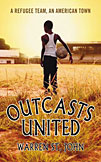 A Refugee Team, An American Town
A Refugee Team, An American Town
by Warren St John
Fourth Estate, £14.99
Reviewed by David Wangerin
From WSC 270 August 2009
In Atlanta to promote his first book, Warren St John came across someone who worked in a nearby refugee settlement and suggested the author “check out the soccer team” there. He did – and discovered that the town of Clarkston, a few miles north-east of the city, had developed into a sort of international refugee centre, teeming with dislocated families from Iraq, Kosovo, Liberia and other trouble spots.
This is happening in a surprising number of places in the US – not cultural melting-pots of starry-eyed migrants chasing the American dream, but clusters of outcasts escaping the horrors of war and coming to terms with their adopted home. What they endured just in making it to the States is often beyond comprehension and while their new life offers some salvation, it is no Elysium. There are long commutes to meagre jobs; drugs, guns and gangs for the children to avoid; spartan lodgings and inattentive landlords; even wily telemarketers, all too aware that “yes” is one of the few English words the new arrivals know.
One might expect football to provide some relief. But in America, organised soccer is an expensive and decidedly middle-class proposition. It’s only through the efforts of a strong-willed Jordanian migrant named Luma Mufleh that a conduit for some of the immigrant teenagers emerges: the Fugees (for “refugees”). As mentor to a vulnerable group of youngsters, Mufleh makes for an unlikely heroine, but her drill-sergeant coaching is straight from the American vernacular. Rules are made and enforced vigorously (one promising player is even dropped from the team for refusing to cut his hair); practices are mandatory and demanding. Yet the hard-nosed coach has sacrificed much in making the US her home. Players are expected to study as hard as they train – time is set aside for tutoring – and if families need assistance, be it in completing a form or putting food on the table, she is quick to put down her whistle.
Most poignant of all, though, is the widespread desire of the outcasts to get to know “real Americans” – when “real America” largely wants nothing to do with them. Fortunately, St John comes across a few who do. The most remarkable of them is probably an American-born aid agency worker who converted to Islam – “The thing I got to thinking about is: what are the conditions that lead to larger portions of society being generous, humble and selfless?” There can’t be many of those in Georgia.
Like Britain, America is losing its homogeny; like Britain, much of the country resists that change fiercely. This is an even-handed, unpretentious account of one community’s struggle to cope with an extraordinary demographic transformation. While there is no Hollywood ending, an expensive motion picture is apparently in the works. It’s hard to imagine it outstripping the book.